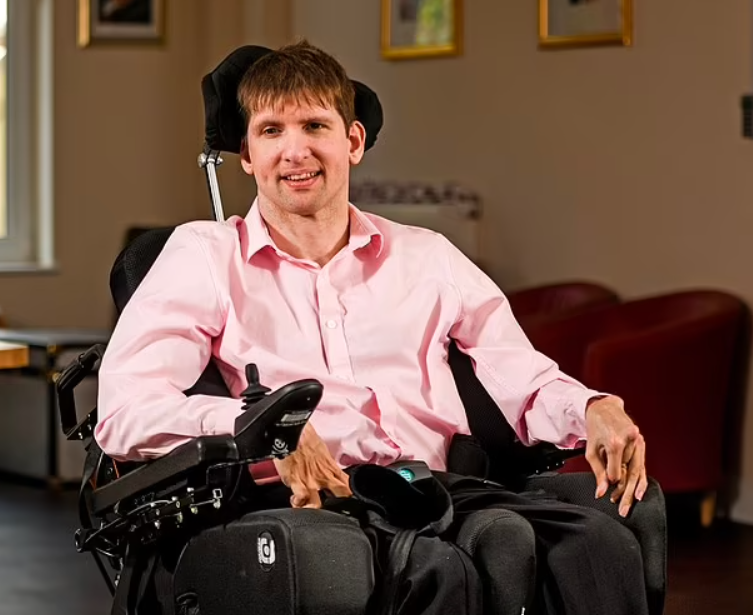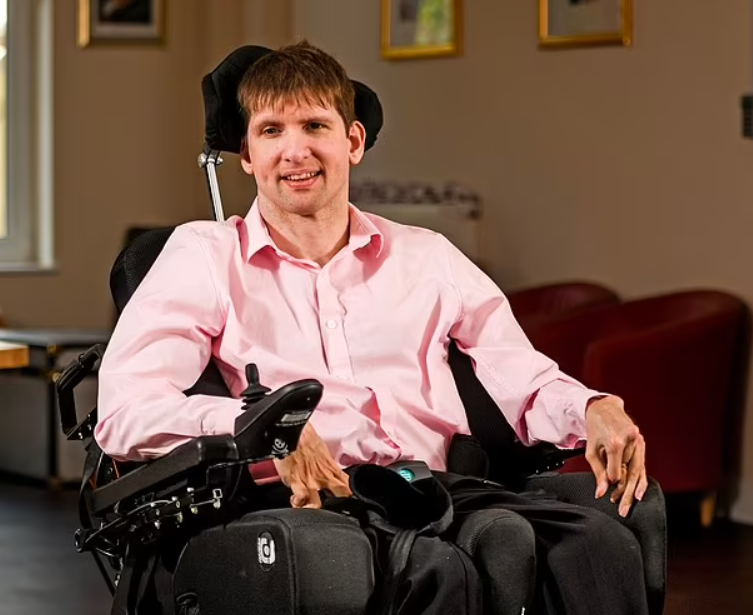“Disabled Man’s Wife and Caregiver Convicted of Enslavement and Abuse, Bringing Long-Awaited Justice”

A disabled man, who had been trapped in an abusive relationship with his wife and caregiver, expressed his satisfaction at witnessing the justice served as they are now confined in a prison cell. Tom Somerset-How, a 40-year-old man with cerebral palsy, revealed how his wife’s mistreatment of him tainted the once pleasant moments they shared prior to her affair. The harrowing experiences he endured have caused sleep disturbances and a loss of trust in people at face value.
Sarah Somerset-How and her lover, George Webb, were convicted last Friday in a landmark case, becoming the first individuals to be found guilty of enslaving another person in such circumstances. Prosecutors outlined how the couple viewed Tom as a source of financial gain, depleting his inheritance while indulging themselves in luxury items like lingerie and DJ equipment. They treated him as a mere possession, barely providing him with the essentials for survival, confining him to bed for 90 percent of his time, limiting his showers to once a week, and leaving him with meager food options such as crisps and a sandwich.
Tom Somerset-How described the moment he heard the guilty verdict as “absolutely beautiful.” He found great satisfaction in the knowledge that Sarah’s lawyers were summoned to the cells, as it symbolized the retribution he had been yearning for. Knowing that they were now incarcerated provided him with a sense of closure and justice. Reflecting on the past, he recollected how he initially met Sarah in 2008 through a mutual friend and was drawn to her kind demeanor. However, the entrance of George Webb, employed as his caregiver in 2016, marked a significant turning point in their relationship.

Initially, things seemed amicable when George joined as his caregiver. Tom adapted his interests to match theirs, even developing an interest in football to engage with them. However, over time, he noticed a change in their behavior. George became disinterested once he settled into his role, and Tom began to question why George was allowed to stay despite being fired for lesser reasons in the past. Sarah’s justification that they were trapped in their arrangement further fueled Tom’s suspicions.
The trial revealed that Sarah and George intentionally isolated Tom from his family, causing immense distress for him. Feeling ostracized and broken, he found it increasingly difficult to see his family, and Sarah used him as an excuse to keep him away from them. Doubts about their affair intensified when he overheard intimate sounds emanating from the living room at odd hours and observed their close, playful interactions. The final blow came when they called an ambulance for George, who suspected a heart attack, and Sarah’s exaggerated emotional distress during the incident struck Tom as disingenuous.
Text messages presented in court demonstrated George urging Sarah to leave Tom and find someone else, emphasizing their exploitation of him. Mrs. Somerset-How’s messages discussing taking money from Tom’s account further solidified the evidence of their intentions. Kate Somerset-Holmes, Tom’s twin sister and an actress, testified about the deplorable conditions she discovered when she ambushed George to gain access to her brother. Tom was found in a disoriented and severely emaciated state, weighing only 6 stones 10 pounds, with unwashed living conditions that were described as disgusting.
The rescue operation, involving the police and social services, took place after Tom managed to alert Gina Zeelie, a friend who then informed his parents. The moment the minibus arrived to transport him to safety felt surreal, as the original plan was for it to park discreetly and pick him up when Sarah and George were absent. Instead, they parked right in front of the house, announcing their intention to take Tom away. While George and Sarah seemed unfazed, Tom and the social worker were overwhelmed by the sudden turn
of events. Tom attended the court proceedings solely to provide evidence for the prosecution and hear the verdict. He made a conscious decision to distance himself during the trial to protect the progress he had made in his emotional healing.
Currently residing in residential accommodation in Bognor Regis, West Sussex, Tom acknowledges the mixed emotions surrounding his former home. Although part of him longs to return to the custom-built house that holds cherished memories, he recognizes that it also carries the weight of painful experiences. Grateful for his current living situation, he acknowledges that without the intervention, both physical and emotional, he received, he might not have survived. Reflecting on his state at the time of rescue, he recalls his friend failing to recognize him due to the dramatic decline in his physical and mental well-being.
The aftermath of the ordeal has left Tom with profound sleep disturbances, only managing a few hours of rest before waking up. The four years of constant fear and insecurity prevented him from feeling safe enough to sleep deeply. Consequently, he now sleeps with two bedside lights on as a subconscious attempt to ward off the darkness that haunted him for so long. Trusting others at face value has become a challenge, as he constantly questions people’s motives and hidden agendas.
Tom expresses deep gratitude for his supportive family and close friends, who have stood by him throughout this traumatic journey. Their unwavering presence has brought him comfort and a sense of security. Aware that not everyone in similar situations has access to such a support network, he advocates for change.
He believes social workers should directly communicate with the individuals under the care of caregivers, rather than solely relying on interactions with the caregivers themselves. He hopes that sharing his experience will raise awareness and ultimately help others who find themselves in similar circumstances.
Helen Somerset-How, Tom’s mother, who holds an MBE for her charitable work, shares her son’s sentiments about the need for careful scrutiny of warning signs by social services. She believes that monitoring private caregivers should be a priority to prevent further cases like her son’s.
Following the conclusion of the trial, George Webb, aged 50, and Sarah Somerset-How, aged 49, were found guilty of holding a person in slavery or servitude. Webb faced an additional conviction of ill-treatment as a care worker, while Sarah Somerset-How was convicted of aiding and abetting him from 2017 to 2020. Prosecutors emphasized that the Somerset-How case was unique, as such charges typically apply to victims who have been trafficked or forced into unpaid labor. Both defendants were remanded in custody and await sentencing, scheduled for a later date.




